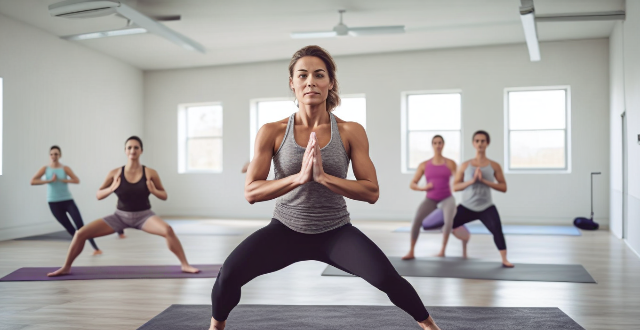Swimming Exercise

What are the benefits of swimming for overall health and fitness ?
Swimming offers numerous benefits for overall health and fitness, including improved cardiovascular health, muscle strength and tone, joint mobility and flexibility, weight management, mental health, injury recovery and rehabilitation, and socialization. It is a low-impact, high-intensity workout that engages all major muscle groups in the body, making it an effective way to build strength and tone muscles without putting undue stress on the joints. Additionally, the buoyancy of water helps to reduce pressure on the joints, making swimming an ideal exercise for people with arthritis or other joint issues. Swimming also burns a significant number of calories, making it an effective way to manage weight. The rhythmic nature of swimming can be meditative, helping to clear the mind and promote relaxation. Overall, swimming is a great way to improve overall health and fitness.

What are the basic techniques for swimming ?
Swimming is a great form of exercise that can be enjoyed by people of all ages. To swim effectively and safely, it's important to master some basic techniques such as breathing, body position, strokes, and kicking. Proper breathing ensures that you get enough oxygen while swimming and helps you maintain a steady pace. Maintaining the correct body position in the water is essential for efficient swimming. There are several different strokes used in swimming, each with its own unique technique. Kicking provides additional propulsion and helps maintain a stable body position in the water. By mastering these basic techniques, you'll be well on your way to becoming a proficient swimmer!

Can you recommend any good swimming tutorials for beginners ?
The text provides a summary of good swimming tutorials for beginners, including YouTube video lessons, Udemy courses, American Red Cross online tutorials, Swimming World Magazine series, and Total Immersion unique approach to efficient swimming. It encourages readers to try these resources and enjoy swimming.

How can I improve my breathing technique while swimming ?
Improving your breathing technique while swimming is crucial for better performance and endurance. Understand basics, practice proper rhythm, use core muscles, work on exhalation, do dryland training, visualize success, and seek professional guidance to enhance breathing and overall swimming skills.

Can you suggest any resources or tools to help me practice swimming on my own ?
Swimming is a great form of exercise that offers numerous health benefits. If you're looking to practice swimming on your own, there are several resources and tools available that can help you improve your skills and technique. These include online video tutorials, mobile apps, books and e-books, and other resources. Online video tutorials can be found on YouTube channels such as Swim Lessons with Jenny, Swim University, and Swimming World Magazine. Websites like SwimOutlet's Learn to Swim Guide and Fitter and Faster also offer comprehensive guides with video tutorials. Mobile apps such as MySwimPro, Swim.com, and Coach's Eye offer personalized training plans, social platforms, and video analysis tools respectively. SwimLog and Swimtag are swimming logs and trackers that help swimmers keep track of their progress in the pool. Books and e-books such as Swimming for Dummies, The Complete Guide to Swimming, The Swimming Anatomy Book, and The Science of Swimming Faster provide detailed instructions on mastering different swimming styles, improving technique, understanding biomechanics, and scientific insights into improving speed and efficiency. In conclusion, utilizing these resources and tools can effectively help you practice swimming on your own and make significant progress in your skills and technique. However, always prioritize safety when practicing alone, and consider seeking guidance from a qualified coach or instructor if needed. Happy swimming!

What factors should I consider when buying a swimsuit for competitive swimming ?
Factors to Consider When Buying a Swimsuit for Competitive Swimming: Material, Compression, Fit, Chlorine Resistance, and Style.

What are the benefits of aerobic exercise ?
Aerobic exercise, also known as "cardio," is a form of physical activity that increases your heart and breathing rate. It's any activity that keeps large muscles moving in a rhythmic manner for an extended period of time. Some examples include brisk walking, jogging, swimming, cycling, and dancing. The key benefits of aerobic exercise include improved heart health, weight management, boosted immune system, improved lung function, reduced stress, improved sleep, boosted mood, increased brain volume, slowed age-related cognitive decline, improved stamina, enhanced bone health, and promoted longevity. Incorporating aerobic exercise into your lifestyle can greatly improve your quality of life.

Can fitness trackers be used for swimming ?
Fitness trackers can be used for swimming, but they must be waterproof or swim-proof. Look for features such as heart rate monitoring, stroke analysis, distance and pace tracking, GPS, and long battery life. Make sure to wear the tracker properly, rinse it after each use, charge it regularly, and sync your data to track your progress.

How does exercise improve cognitive function ?
Exercise plays a crucial role in enhancing cognitive function, including memory, attention, and problem-solving skills. It promotes brain plasticity, increases blood flow and oxygenation, reduces inflammation, and improves sleep quality. Incorporating exercise into your routine can be done through various activities such as running, swimming, or yoga. Start small and gradually increase intensity and duration, find enjoyable activities, incorporate mindful movement, make it social, set realistic goals, and consult with a professional if needed.

Can aerobic exercise improve my cardiovascular health ?
Aerobic exercise is essential for maintaining and improving cardiovascular health, offering benefits such as strengthened heart muscle, lowered blood pressure, increased HDL cholesterol, reduced inflammation, weight management, improved circulation, and better blood sugar regulation. Regular aerobic activities like walking, jogging, cycling, swimming, or group fitness classes can significantly enhance overall heart health. The American Heart Association recommends at least 150 minutes of moderate-intensity aerobic exercise weekly, spread throughout the week, to achieve these benefits.

How often should women exercise to see results ?
Exercising regularly is crucial for women's health, and the recommended frequency varies based on the type of exercise. Cardiovascular exercises are recommended at least 150 minutes per week, while strength training should be done at least twice a week. Flexibility and balance exercises should be included in the routine at least once a week. Various factors such as age, goals, fitness level, lifestyle, and health conditions can impact the effectiveness of the workout routine. It is essential to listen to your body and adjust your exercise routine accordingly to achieve optimal results and maintain a healthy lifestyle.

Can regular exercise help with insomnia ?
Insomnia, a sleep disorder making it hard to fall or stay asleep, affects many. Regular exercise is emerging as a natural remedy for insomnia. Exercise can positively impact sleep quality and duration by regulating the circadian rhythm and releasing endorphins. It also reduces stress and anxiety, leading causes of insomnia. Regular exercise boosts energy levels and mental health, further promoting better sleep. The recommended amount is 150 minutes of moderate-intensity activity weekly, including muscle-strengthening exercises. Tips for exercising with insomnia include choosing low-impact activities, avoiding high-intensity workouts at night, establishing a routine, being mindful of caffeine intake, and consulting a doctor before starting an exercise program.

Can aerobic exercise help me lose weight ?
Aerobic exercise, or cardio, is an effective way to lose weight. It increases heart rate and breathing, leading to higher calorie burn during and after the workout. Moderate-intensity aerobic activities also use fat as fuel, improving metabolic rate for further calorie expenditure at rest. Regular cardio can strengthen heart muscles for efficient blood pumping and contribute to muscle endurance. Types of aerobic exercises include running, cycling, swimming, walking, and group fitness classes like Zumba. To successfully incorporate aerobic exercise into a weight loss plan, it's recommended to start slowly, mix up activities, stay consistent, and combine with strength training. Potential challenges such as overexertion and plateaus in progress should be managed by adjusting routines. Overall, aerobic exercise can aid in weight loss when part of a balanced fitness regimen.

How can I incorporate aerobic exercise into my daily routine ?
Incorporating aerobic exercise into your daily routine can improve cardiovascular health, burn calories, and enhance mood and energy levels. Here are ways to seamlessly incorporate aerobic exercise into your day: 1. **Morning Vigor**: Start the day with activities like jogging, cycling, or jump roping. 2. **Lunch Break Activities**: Use your lunch break for stair climbing, walking meetings, or yoga. 3. **Post-Work Energy Booster**: After work, engage in gym sessions, outdoor sports, or dancing. 4. **Evening Wind-Down**: Before bedtime, consider gentle exercises like evening walks, Tai Chi, or swimming. 5. **Weekend Adventures**: On weekends, engage in longer duration exercises like hiking, biking, or water sports. 6. **Lifestyle Integration**: Make aerobic exercise a habit by commuting actively, doing active errands, or using fitness trackers.

Is it safe to exercise during pregnancy and what precautions should be taken ?
Is it safe to exercise during pregnancy? Yes, as long as you follow certain precautions and guidelines, including consulting your healthcare provider, choosing appropriate exercises, listening to your body, staying hydrated, wearing comfortable clothing, using proper technique, avoiding lying flat on your back, not pushing yourself too hard, cooling down properly, and being mindful of environmental factors. Exercise can have numerous benefits for pregnant women, such as reducing the risk of gestational diabetes, improving mood, increasing energy levels, and helping with recovery after birth.

What are some popular social activities that involve physical exercise ?
Popular Social Activities Involving Physical Exercise include community sports leagues, outdoor adventure groups, fitness classes, cycling and running events, water sports, winter sports, gym partners, and community challenges. These activities promote physical health while fostering social connections and a sense of community.

Is weight-bearing exercise really necessary for bone health ?
Weight-bearing exercises are often recommended for maintaining bone health, but is it really necessary? Let's explore this topic in detail. Weight-bearing exercises include any activity that requires you to carry your own body weight, such as walking, jogging, dancing, climbing stairs, and weightlifting. These exercises can help strengthen bones and muscles, improve balance and coordination, and reduce the risk of falls. Maintaining healthy bones is crucial for overall health and well-being. Strong bones provide support and protection for your body, allowing you to move with ease and perform daily activities without pain or discomfort. Additionally, having strong bones can help prevent fractures and other injuries. Weight-bearing exercises have numerous benefits on bone health, including stimulating bone growth, improving bone density, reducing the risk of falls and injuries, and promoting overall health and well-being. However, there are some alternatives to weight-bearing exercise that may be beneficial for people who cannot engage in these types of activities. These include resistance training, yoga or Pilates, and swimming. In conclusion, weight-bearing exercises are highly recommended for maintaining bone health due to their numerous benefits on bone growth, density, and overall health and well-being. However, there are alternative exercises that may be beneficial for people who cannot engage in weight-bearing activities. It's always best to consult with a healthcare professional before starting any new exercise program.

Does consistent exercise regulate sleep patterns ?
Consistent exercise has been shown to have a positive impact on sleep patterns, helping regulate the body's internal clock and increase the production of sleep-promoting hormones. Regular physical activity can lead to better sleep quality, reduced stress and anxiety, and improved overall health. To reap these benefits, it's important to incorporate regular exercise into your routine, starting slowly and gradually increasing intensity and duration over time.

How can older adults with chronic conditions incorporate exercise into their daily routine ?
Incorporating exercise into the daily routine of older adults with chronic conditions is crucial for maintaining their overall health and well-being. Here are some tips on how they can achieve this: * Start slowly by gradually increasing the duration and intensity of low-impact exercises like walking or swimming. * Choose appropriate exercises that focus on strength training, flexibility, and range of motion to reduce the risk of injury. * Set realistic short-term and long-term goals to build momentum and confidence. * Make exercise a habit by scheduling specific times during the day and creating a routine. * Stay safe and comfortable by wearing appropriate gear, staying hydrated, and seeking professional advice when needed. * Track progress in a journal and celebrate milestones to stay motivated.

What is the best way to monitor heart rate during exercise ?
Monitoring heart rate during exercise is crucial for staying healthy and achieving fitness goals. The best way to monitor heart rate during exercise depends on personal preferences and fitness goals. Wearable heart rate monitors are convenient and non-invasive, while chest straps provide accurate data. Fingertip devices are affordable and easy to use, but less accurate than other methods. Smartphone apps are free or inexpensive, but may not work well in certain situations. Ultimately, the choice between these methods should be based on individual needs and preferences.

How does exercise affect sleep patterns and quality ?
Exercise significantly influences sleep patterns and quality. Immediate effects include increased alertness and better body temperature regulation for sleep. Long-term, regular exercise improves sleep quality and regulates sleep patterns. Different types of exercise—aerobic, anaerobic, and mindful movements like yoga—all positively affect sleep but may require varying recovery times. The timing of exercise is crucial; morning workouts set the day's tone with minimal sleep interference, while late-night exercises can hinder sleep preparation. Tailoring workout routines to individual needs optimizes rest and overall well-being.

Is it safe to start a new exercise program during pregnancy ?
Is it safe to start a new exercise program during pregnancy? This article explores the topic, highlighting health benefits and potential risks. It emphasizes consulting with healthcare providers, choosing appropriate exercises, and monitoring body responses for safety.

Is there a specific type of exercise that is most effective for enhancing cognitive abilities ?
Exercise has been shown to have numerous benefits on cognitive abilities, but is there a specific type of exercise that is most effective? Aerobic exercise improves blood flow and reduces stress, while resistance training boosts BDNF levels and enhances executive function. Combination exercises provide a comprehensive workout for the body and brain. Finding an exercise routine that you enjoy and can stick to is key to reaping the cognitive benefits over time.

Can exercise be used as a treatment for chronic diseases like diabetes or hypertension ?
Exercise can be used as a treatment for chronic diseases like diabetes and hypertension by improving insulin sensitivity, promoting weight loss, reducing cardiovascular risk, and providing stress relief. Recommended exercises include aerobic activities, resistance training, yoga, and tai chi. It is important to consult with a healthcare professional before starting an exercise program.

Is it safe to start an exercise program if you have a history of heart problems ?
Starting an exercise program is generally beneficial for overall health, but it's important to take precautions if you have a history of heart problems. Here are some factors to consider: 1. Consult with your doctor before starting any exercise program, especially if you have a history of heart problems. 2. Start slowly and gradually increase the intensity and duration of your workouts over time. 3. Choose low-impact exercises such as swimming, cycling, or yoga to improve cardiovascular health without putting too much strain on your heart. 4. Monitor your symptoms during and after exercise, and stop immediately if you experience any symptoms such as chest pain, shortness of breath, or dizziness. 5. Stay hydrated and nourished by drinking plenty of water and eating a healthy diet that includes plenty of fruits, vegetables, whole grains, and lean proteins.

How does exercise affect sleep quality ?
Exercise is crucial for maintaining a healthy lifestyle and has a significant impact on sleep quality. Regular physical activity can improve sleep onset, increase deep sleep, reduce stress and anxiety, regulate body temperature, and promote better breathing during sleep. To incorporate exercise into your daily routine, start slowly, choose enjoyable activities, schedule workouts, mix up your routine, be mindful of timing, listen to your body, stay hydrated, get enough rest, seek support, and track your progress.

Can excessive exercise lead to sleep disorders ?
Overtraining can cause sleep disorders by disrupting normal sleep patterns and causing physical stress and fatigue. Relaxation techniques such as meditation, yoga, or deep breathing exercises can help calm your mind and body before bed. Adjusting your exercise routine and creating a consistent sleep schedule can also improve sleep quality. If you continue to experience sleep disturbances, consult with a healthcare professional for further evaluation and treatment.

How much exercise do I need to maintain good cardiovascular health ?
Maintaining good cardiovascular health requires regular exercise, with the American Heart Association recommending at least 150 minutes of moderate-intensity aerobic activity or 75 minutes of vigorous-intensity aerobic activity each week, along with two or more days of muscle-strengthening activities. The amount of exercise needed may vary depending on individual needs and fitness level, and other lifestyle factors such as diet, stress management, sleep, and avoiding smoking and excessive alcohol consumption can also contribute to good cardiovascular health.

How does exercise influence mood and emotional stability ?
Exercise has a positive impact on mood and emotional stability by releasing endorphins, reducing stress hormones, enhancing resilience, promoting mindfulness, and providing a sense of achievement. Incorporating regular exercise into your lifestyle can lead to better mental health and overall well-being.